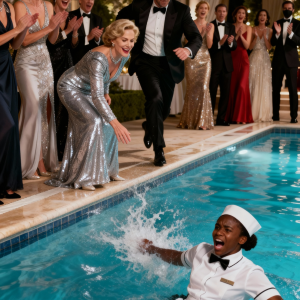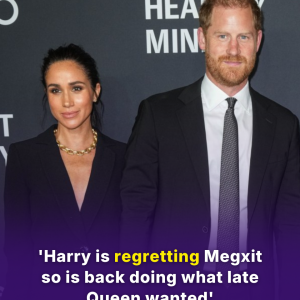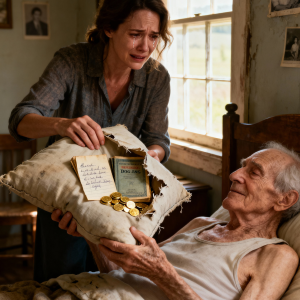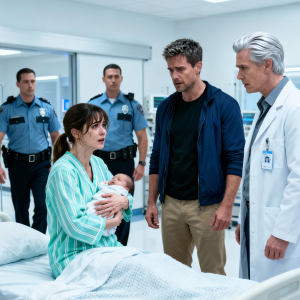
The fluorescent lights of Saint Harlow Medical Center cast a sterile glow over the corridor, but it did little to warm the icy tension in the air. Lieutenant Marcus Sterling had walked through combat zones, seen the worst of humanity, and survived the chaos of urban warfare—but nothing had prepared him for the battlefield he now faced: the waiting room outside his grandfather’s hospital room.
He had flown back from New York on emergency leave. Harold Sterling, the man who had raised him after his father abandoned the family, lay frail on a hospital bed, a tangle of tubes and monitors his only connection to the world. Marcus held nothing in his hands but hope, the desperate wish to see him alive once more.
But his relatives had other ideas.
“You shouldn’t even be here,” hissed his cousin Julian, blocking the doorway with the confidence of someone used to being obeyed. Julian had never served, never faced a threat beyond his own reflection, and he wielded that ignorance like armor. “You’re just a desk jockey in Manhattan, running around pretending you care. Don’t play the hero now.”
Beside him, Aunt Margot’s expression was sharp as glass. “You abandoned us long ago,” she said, voice dripping with accusation. “And now you come running back because you think there’s something to gain? Do you honestly believe we’ll bow to a uniform?”
Marcus’s jaw tightened. He had faced insurgents and roadside bombs; he had stared death in the eye more times than he could count. Yet this venom from blood that should have loved him stung far worse. He looked past them, at the opaque window of his grandfather’s room. Every second spent arguing was a second lost.
“You don’t belong here,” Margot continued. “You gave up this family the day you traded our home for the Army.”
Her words hit him harder than shrapnel ever could. His heart burned with restrained fury, yet beneath it lay a deeper pain, a grief no battlefield had ever taught him to endure.
And then, Marcus acted. Not recklessly, not violently, but with the precision honed over a decade of military service. He pulled out his phone and dialed a number. One call, and everything would change.
The room stiffened as he spoke into the receiver. “Lieutenant Sterling here. Begin protocol. Everything must be documented,” he said quietly, calmly, with a quiet authority that made Julian falter.
“What are you doing, Marcus?” Julian snapped, trying to hide a tremor in his voice. “You calling your buddies to intimidate us? Do you think we’re scared?”
Marcus didn’t respond. He stepped past Julian, using the same careful control he had relied on during countless operations. The door opened, and there he was: Harold Sterling, his eyes barely open, breathing shallowly through the mask.

He knelt beside him, clasping his frail hand in his own. “I’m here, Grandpa,” he whispered. “I haven’t left you.”
Recognition flickered in Harold’s eyes, a faint squeeze returned. That was all Marcus needed.
The voices behind him grew frantic, accusations tumbling out like water from a broken dam. “You’re manipulating him!” Margot shouted. “You don’t even belong here!”
And then a knock came, measured and firm.
Two men in tailored suits entered, badges glinting under the hospital lights. Federal investigators. Silence fell, broken only by the steady beep of the monitors.
“We need to speak with everyone here regarding Mr. Harold Sterling’s estate and certain irregularities,” the taller agent said calmly. “Transactions, property transfers, and withdrawals that raise serious concerns. Certain family members appear to have been taking advantage of his condition.”
Shock rippled across Julian’s face. Marcus finally spoke, his voice steady. “While I was away, I was entrusted with his power of attorney. My grandfather’s dignity matters more than inheritance. I am here to protect it.”
The room erupted in confusion, protestations, and defensive stammers. Papers were produced, evidence laid bare. Julian’s bravado collapsed, Margot clutched at her chest, and the truth pierced through every lie they had spun.
Marcus returned his attention to his grandfather. “It’s safe now, Grandpa. They can’t hurt you anymore,” he murmured. A faint smile brushed Harold’s lips before sleep claimed him again.
In the following hours, the hospital became a flurry of legal formalities. Statements were taken, documents signed, relatives questioned. By the next morning, the atmosphere had shifted, quiet, almost reverent. Marcus remained at Harold’s side, the sole anchor of loyalty.
When his grandfather passed two days later, Marcus held his hand. Not Julian, not Margot, but him, the grandson who had never abandoned him, who had fought a battle far fiercer than any overseas.
The funeral was intimate. Local veterans in crisp uniforms saluted the casket draped with the flag, and Marcus delivered the eulogy, steady and unwavering, honoring a life of integrity and quiet courage. Whispers of shame circled his relatives in the back pews.

Weeks later, the estate settled. Harold had left Marcus the family cabin and land in Vermont, the very place where summers had taught him resilience and strength. “For Marcus,” the note read, “because loyalty and honor are worth more than wealth.”
Standing on the familiar hilltop months later, in civilian clothes and at peace, Marcus felt a weight lift from his shoulders. He had been doubted, dismissed, and insulted, yet the truth had prevailed.
He was no mere desk officer, no outsider. He was a grandson who had fought the most important battle of all: the one fought with love, integrity, and unwavering devotion.
And he had emerged victorious.




